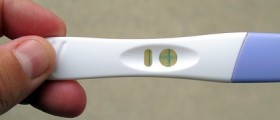
Also, after a woman conceives, the progesterone shortage can cause a miscarriage. This explains the importance of the right levels of progesterone in the female body and why insufficient progesterone impairs female fertility. Fortunately, infertility due to low progesterone levels can be successfully treated and reversed.
Progesterone Infertility
Progesterone is one of the key female hormones, with a significant role in conception and pregnancy. Progesterone is made by the corpus luteum formed in the ovary immediately after ovulation. Production of progesterone regulates the entire menstrual cycle. The hormone prepares the uterus for conception by building up the endometrial lining to enable implantation of the fertilized egg. Progesterone also causes increase in body temperature during ovulation.
However, deficiency of progesterone prevents the thickening of the uterine wall required for implantation. If pregnancy does not occur, the progesterone levels start to decrease dramatically within a several days. This triggers the shedding of the endometrial lining of the uterus resulting in menstrual bleeding.
Deficiency of progesterone causes the luteal phase of menstrual cycle to be shorter. The luteal phase is a part of the cycle that begins with ovulation and ends the day before the next period. It typically lasts between 10 and 16 days. However, if the luteal phase is short, successful implantation is very unlikely to occur.
When the egg is fertilized, levels of progesterone keep rising to prevent shedding of the secretory endometrium thus protecting the embryo. On the other hand, if progesterone levels significantly drop during early pregnancy it may result in a miscarriage.
Treatment for Progesterone Infertility
In some women, progesterone infertility may be due to an excess of estrogen (dominance) whilst in other it may result from failure of the corpus luteum to produce enough progesterone (deficiency of progesterone).
Infertility caused by low levels of progesterone can be detected by hormone-specific blood tests and managed with natural or synthetic progesterone therapy.
Progesterone therapy has to be started two to three days after ovulation and continued until pregnancy or menstrual period occurs. Progesterone therapy may be given in oral form, as an injection or as a cream. All in all, progesterone therapy may help women to conceive relatively quickly and pregnancy rates in women who are taking this therapy are as high as 77%.
















Your thoughts on this
Loading...